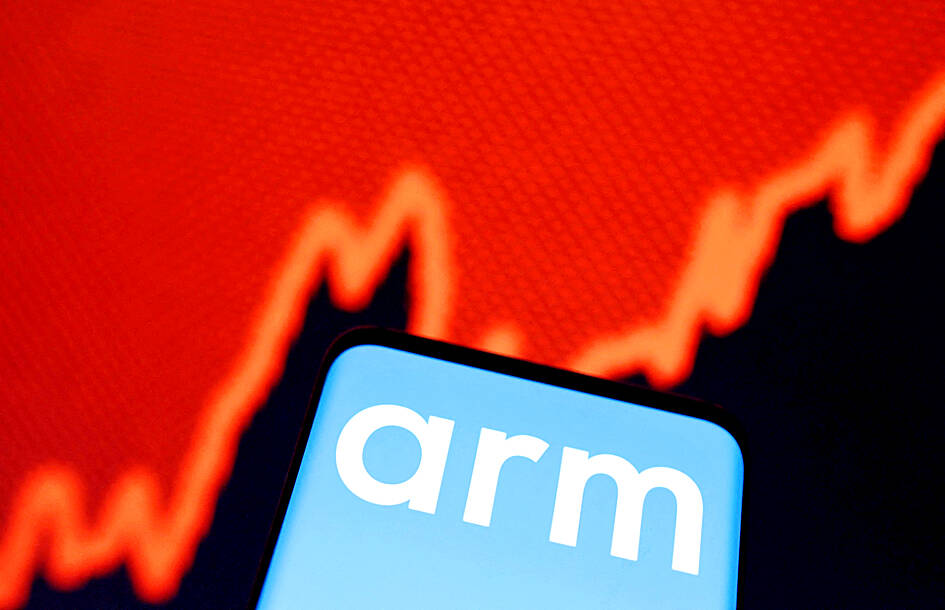British chip designer Arm Ltd, backed by Softbank Group Corp, is in talks with potential strategic investors including Intel Corp to anchor what is expected to be one of the largest initial public offerings (IPOs) of the year, people familiar with the matter said.
Arm has held talks with other companies about participating in the IPO, the people said, asking not to be identified because the matter is private.
The talks are early and could still fall apart ahead of the listing, the people added.

Photo: Reuters
It is also unclear how much would be invested in Arm or what the structure would be.
Arm is looking to raise as much as US$10 billion in its listing in New York later this year, Bloomberg News previously reported.
Representatives for Intel and Arm declined to comment.
Bringing on an anchor investor in an IPO can help drum up interest and momentum, especially in a rough market for new listings. If the talks succeed, Intel would eventually be listed in Arm’s IPO prospectus ahead of the listing.
Anchor investors buying US$100 million to US$200 million worth of shares have been popular for semiconductor-related IPOs in the past few years. Growth equity firm General Atlantic invested about US$100 million in Intel-backed Mobileye Global Inc’s IPO last year, while Qualcomm Inc backed GlobalFoundries Inc’s listing in 2021.
A key part of Intel chief executive officer Pat Gelsinger’s push to return the company to the pinnacle of the semiconductor industry is a plan to open up its factories to other firms, even rivals. If he is to be successful in competing with Taiwan Semiconductor Manufacturing Co (台積電) in outsourced production, Intel would have to produce chips that contain Arm’s widely used technology.
The two have already announced a technical tie-up. Arm’s designs and industry-standard instruction set are used in everything from Broadcom Inc networking chips to Apple Inc processors in the iPhone and Macs to Qualcomm Inc’s ubiquitous chips for mobile phones.
By taking a position in Arm, whose technology has enabled direct competition for Intel’s processors, Gelsinger might be seeking to show his commitment to Arm and to embracing that openness. Throughout its more than 50-year history, Intel’s plants have almost exclusively worked on its own designs.
Softbank founder Masayoshi Son has said he hopes the Arm IPO can be the largest ever by a chip company.
Arm’s valuation still has not been set and the company could be valued anywhere from US$30 billion to US$70 billion, Bloomberg News previously reported.

SEMICONDUCTORS: The German laser and plasma generator company will expand its local services as its specialized offerings support Taiwan’s semiconductor industries Trumpf SE + Co KG, a global leader in supplying laser technology and plasma generators used in chip production, is expanding its investments in Taiwan in an effort to deeply integrate into the global semiconductor supply chain in the pursuit of growth. The company, headquartered in Ditzingen, Germany, has invested significantly in a newly inaugurated regional technical center for plasma generators in Taoyuan, its latest expansion in Taiwan after being engaged in various industries for more than 25 years. The center, the first of its kind Trumpf built outside Germany, aims to serve customers from Taiwan, Japan, Southeast Asia and South Korea,

Gasoline and diesel prices at domestic fuel stations are to fall NT$0.2 per liter this week, down for a second consecutive week, CPC Corp, Taiwan (台灣中油) and Formosa Petrochemical Corp (台塑石化) announced yesterday. Effective today, gasoline prices at CPC and Formosa stations are to drop to NT$26.4, NT$27.9 and NT$29.9 per liter for 92, 95 and 98-octane unleaded gasoline respectively, the companies said in separate statements. The price of premium diesel is to fall to NT$24.8 per liter at CPC stations and NT$24.6 at Formosa pumps, they said. The price adjustments came even as international crude oil prices rose last week, as traders

Taiwan Semiconductor Manufacturing Co (TSMC, 台積電), which supplies advanced chips to Nvidia Corp and Apple Inc, yesterday reported NT$1.046 trillion (US$33.1 billion) in revenue for last quarter, driven by constantly strong demand for artificial intelligence (AI) chips, falling in the upper end of its forecast. Based on TSMC’s financial guidance, revenue would expand about 22 percent sequentially to the range from US$32.2 billion to US$33.4 billion during the final quarter of 2024, it told investors in October last year. Last year in total, revenue jumped 31.61 percent to NT$3.81 trillion, compared with NT$2.89 trillion generated in the year before, according to

PRECEDENTED TIMES: In news that surely does not shock, AI and tech exports drove a banner for exports last year as Taiwan’s economic growth experienced a flood tide Taiwan’s exports delivered a blockbuster finish to last year with last month’s shipments rising at the second-highest pace on record as demand for artificial intelligence (AI) hardware and advanced computing remained strong, the Ministry of Finance said yesterday. Exports surged 43.4 percent from a year earlier to US$62.48 billion last month, extending growth to 26 consecutive months. Imports climbed 14.9 percent to US$43.04 billion, the second-highest monthly level historically, resulting in a trade surplus of US$19.43 billion — more than double that of the year before. Department of Statistics Director-General Beatrice Tsai (蔡美娜) described the performance as “surprisingly outstanding,” forecasting export growth